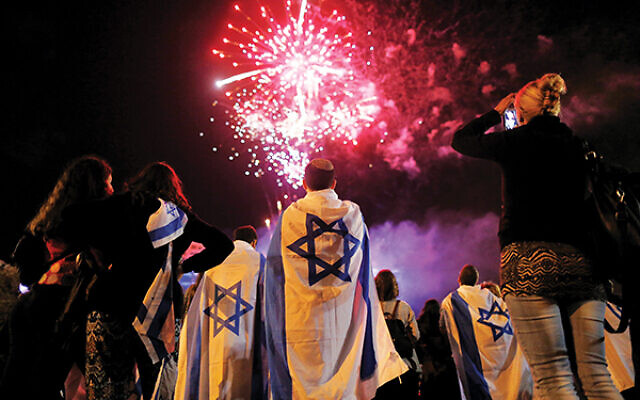Celebrating Israel’s resilience, achievements
Israeli ambassador to Australia Mark Sofer: 'Resilience is the emergence from tragedy and crisis as better people and as a stronger society'.
ANYONE who has been in Israel over Yom Ha’atzmaut knows that it is celebrated outdoors.
Barbecues, hiking, street parties, musical events, family picnics, dancing, singing. In short, a day when in spite of – or perhaps because of – the pressures of everyday life, for 24 hours we can let our hair down and paint the town blue and white.
This year should have been no different. The anxieties and tensions have not diminished, indeed with every danger that we overcome, another rears its head.
We continue to live in the world’s worst neighbourhood – the carnage in Syria continues; Lebanon’s inexorable march from a failing state to a failed state goes on unabated; Hamas and Hezbollah persist in dedicating their resources to the sole aim of murdering and maiming Israelis and none to the betterment of their own society; Libya and Yemen continue to massacre their own people; and actively orchestrating this entire maelstrom sits the Iranian regime with its open intent to eradicate the world’s only Jewish state, not least through attaining nuclear weapon capability.
Given that and given the internal political turmoil, we could so easily sit around and mope. We could so effortlessly slide into pessimism and, as the adage goes, focus on the hole not on the bagel.
But this is not how we do things. Since this year, of course, we need to take a rest from the outdoors, we should use it as a day of reflection, a day when we look back on our achievements. And we can do so with no small amount of satisfaction.
Since circumstances force us this year to remain indoors, we must use this Yom Ha’atzmaut to look at the wider picture and reflect on what we have achieved over the past 72 years, and we can be proud that most other countries, including those which have been around for so much longer than us and which face nothing even approaching our trials and tribulations, view us with envy.
We can reflect on a society which has absorbed millions of immigrants from throughout the globe, on how we conquered the desert, on how we have become the agricultural saviour of so much of the developing world, on how we have created drinking water from air, put a spaceship in the moon’s orbit, hold more Nobel Prize winners per capita than the US, Germany, the EU or France, have over 20 per cent of the world’s cybersecurity capacity, and on how, in a few short years, we have become the start-up nation, despite having no natural resources.
Today, no one bats an eyelid, not even among the Iranian leadership, when along with only a handful of other countries (including Australia), the world’s eyes turn to Israel to find a cure and a vaccine for the coronavirus. It is a given, a natural progression, taken for granted.
And if we ask ourselves how all this and more has been achieved, despite the massive security threat facing us, the answer lies in one word – a word which Australians can so easily relate to – “resilience”. Resilience is not new to the Jewish people. It did not suddenly appear in our lexicon.
Indeed, as we read in Mishlei (Proverbs), “the righteous fall seven times, and rise up again”, it continues through the destruction of the Temples, through the calamity of the Inquisition, through the horrors of the Holocaust and through antisemitism across the ages which continues to rear its head even today, be it in one of the western world’s great political institutions, be it inherent in the intrinsically antisemitic BDS movement or be it in the synagogue shootings in the US, Germany or elsewhere.
Resilience is the quality of being able to adapt and bounce back from hardship. Resilience is the emergence from tragedy and crisis as better people and as a stronger society. And if one people, one country has proved resilient, it is the Jewish people and the State of Israel. Resilience arises from experience and from the knowledge that others care. Israel’s resilience today emanates not only from the hardships it has endured since its modern-day inception, but from the understanding that behind it lies the Jewish world and the very many millions of friends it has outside it.
Resilience carries with it duties, not only advantages. Being resilient does not by any measure mean being impervious. On the contrary, it demands learning from the experience, it means sharing the knowledge, it means tikkun olam. It demands from us that not only must we rely on ourselves to achieve a flourishing State of Israel, but we must constantly strive to achieve a better and more equitable society within, and peace with our neighbours, for the sake of all our children.
So this Yom Ha’atzmaut is not a time for pessimism. We all know the Jewish joke of two elderly pessimistic Jewish men sitting on a park bench where one asks the other, “How has your year been?” To which his friend replies, “not nearly as bad as next year”.
Yom Ha’atzmaut is a time for reflection as to how we can emerge stronger and better from the current crisis engulfing us. And perhaps we can also reflect on why so many Jewish jokes are about two elderly men sitting on a park bench. Isn’t it about time they stood up and walked on?
Chag atzmaut sameach.
Mark Sofer is the Israeli ambassador to Australia.


comments